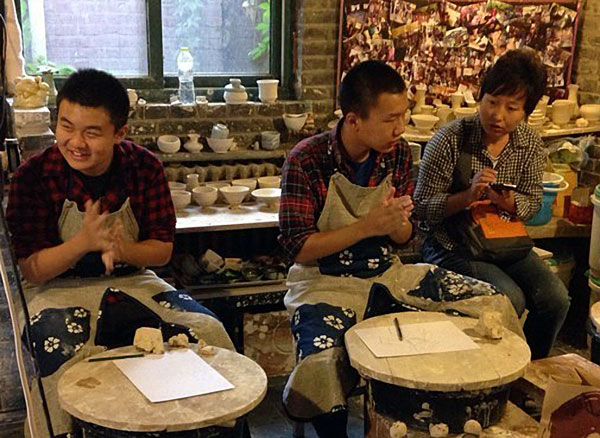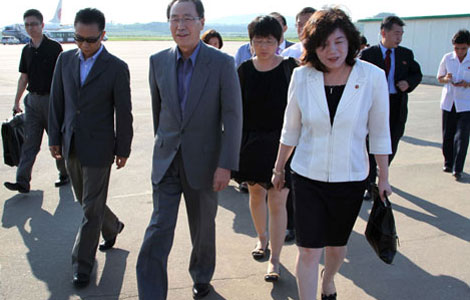Job market proves difficult for autistic talent
Updated: 2013-11-07 08:44
By Fan Feifei (China Daily)
|
||||||||
 |
|
Autistic youths learn to make pottery at the Kangnazhou Autism Family Support center in October. Provided to China Daily |
Ning Ning can type 160 words a minute, a skill that would ordinarily make her a top candidate for any data-entry job. Yet no employers have taken her on.
Like most autistic people in China, the 25-year-old has found herself on the fringes of the country's labor market.
"She was diagnosed when she was 3 years old," her mother Wen Hong said, referring to the developmental disorder characterized by difficulty in communication and repetitive behavior.
"After middle school, she went to a special vocational school, which is where she learned to type," she said. "We've tried finding her work, but no one wants to hire her."
Ning Ning now takes part in "simulated employment" at the Kangnazhou Autism Family Support Center, in Beijing's Changping district. The NGO, founded in July last year, offers training with the aim of helping disabled people land employment.
Students receive a monthly salary of 200 yuan ($33) to encourage them to practice their work skills.
"Adults with autism are rarely employed in China," said Wen, one of five parents who co-founded the center and chairman of the China Psychiatric Association's autism committee.
A 2012 report on a study by the China Philanthropy Research Institute found the country has 1.64 million people with autism.
"Autistic people have a communication barrier, low comprehension of the environment and some difficulties in interpersonal relationships," Wen said. "It's difficult for them to integrate into society.
"So it's impossible for them to work independently," she said, adding her daughter finds it hard to concentrate and needs constant supervision.
Classes at Kangnazhou include baking, cooking, data entry, music, pottery and other handicrafts, and students attend once a week. Each lesson lasts half a day.
Since it was opened, more than 700 students have passed through its doors, according to the founders.
Parents can also take part in counseling sessions and seminars on how to better cope with autistic children.
This year, the NGO began working with some international organizations to provide professional one-to-one therapy for autistic adults.
Zou Wen, another co-founder of Kangnazhou, has a 16-year-old son with autism, Kang Kang.
"He can make great cakes thanks to the training at Kangnazhou, and he is also skilled in using Microsoft Office," she said.
Although her son does not need to work yet, Zou said she is concerned for his prospects.
"Some companies prefer to pay into employment security funds for disabled people rather than hire them," she said.
Wen agreed. "Even autistic adults who do find work are often fired after only a few months because they have difficulty controlling their emotions."
She said Kangnazhou is exploring a "back-front" employment system, which involves healthy people running the front of a shop, while autistic people work in the back.
Wen said the group is already in negotiations with a bakery about setting up a pilot project.
"According to our research, the employment rate for people facing mental challenges is the lowest compared with other types of disabilities," said Zhou Haibin, a program officer at the International Labor Organization.
He said his agency is working with the Disabled Person's Federation to train more employment counselors to meet the needs of autistic people, offering guidance and working as middlemen for employers.
Their support could be reduced as the client progressed in their job, he said.
Names of the autistic people in this story have been changed on request.
Most Viewed
Editor's Picks

|

|

|

|

|

|
Today's Top News
Sex education cartoon an instant online hit
U. Michigan gets grant for China center
China's increasing role in global nuclear power
Panda cub drawing votes for her name
Firm breaks ground for new Suzhou facility
Program improves bone health in elderly Asians
World to see boom in big firms
Lead author of Obamacare law blames govt for rollout
US Weekly

|

|















